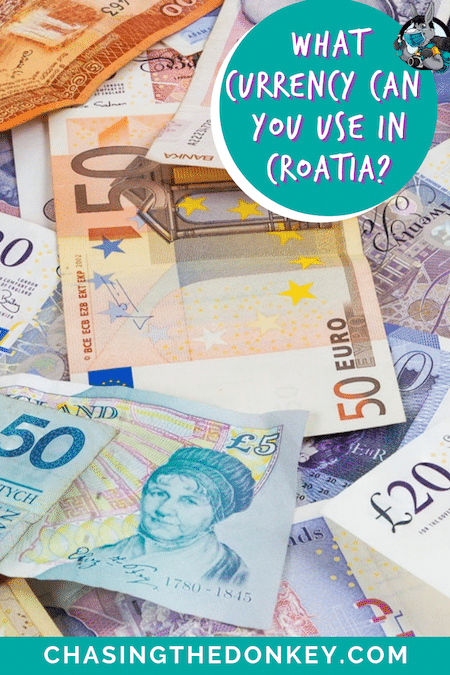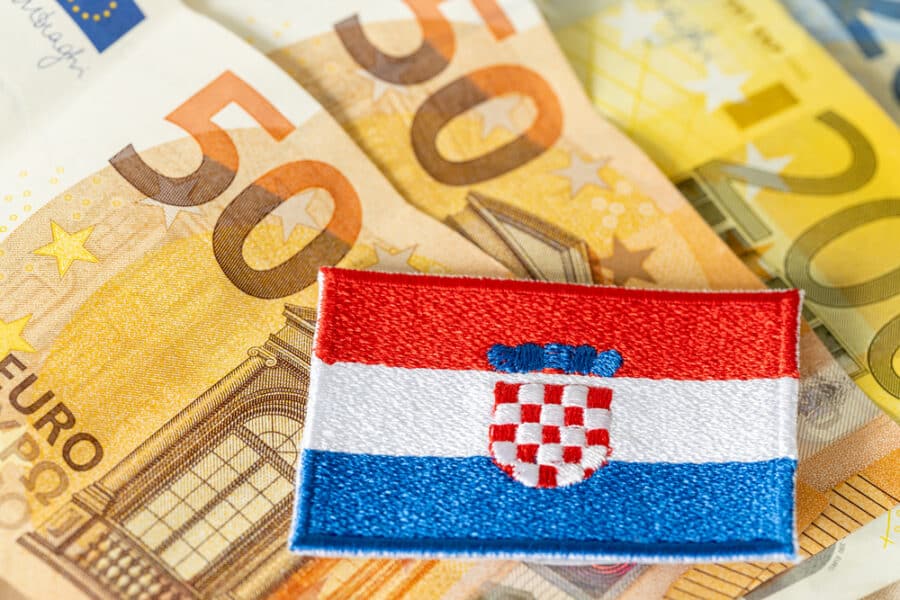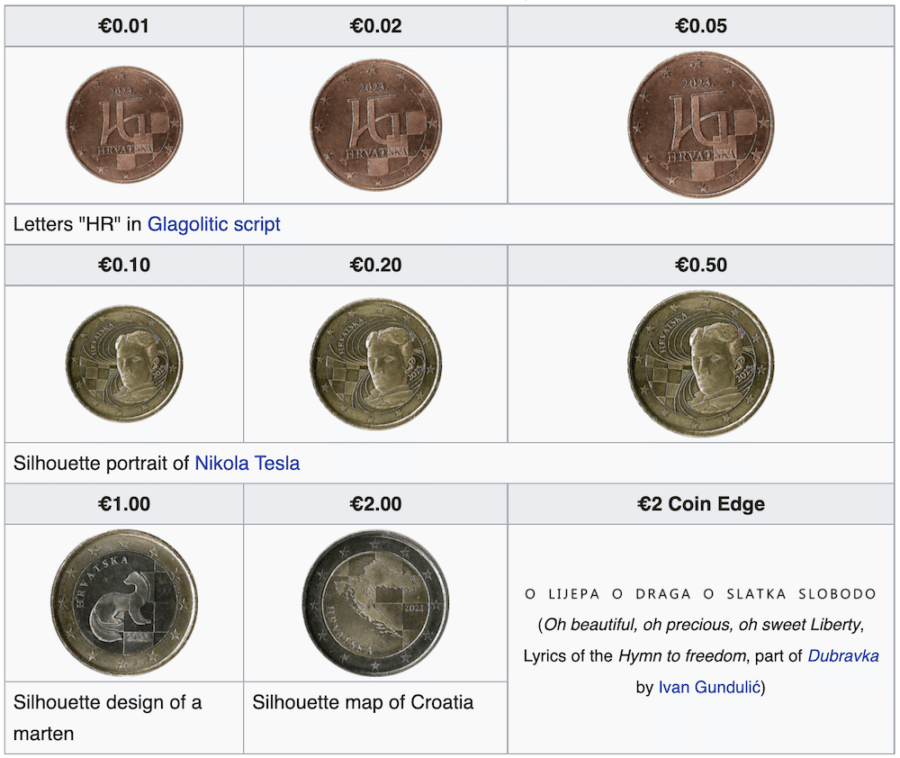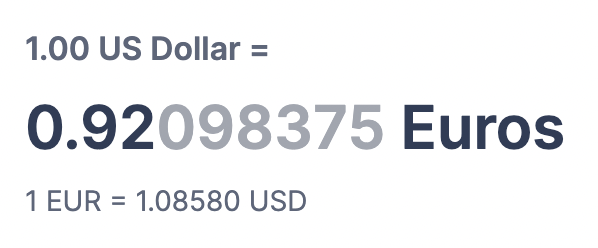Can you use Euros In Croatia? What money do I take to Croatia? Did Croatia adopt the euro? Can I still use kuna? All of these questions and more are answered in this guide to Croatian Currency.

Croatia transitioned from our previous local currency, the Croatian Kuna, to the European euro. This guide will explain what is now the currency in Croatia and how to pay for things while in Croatia now that we are a part of the eurozone.
What Is The Fixed Exchange Rate From Kuna To Euro
The fixed conversion rate of Kuna to euro is established at 1.00 EUR = 7.53450 HRK.
Dual Circulation
Dual circulation ended on 14 January 2023. If you have Kuna banknotes or Lipa coins from a previous trip, these were able to be exchanged for euros at banks in Croatia until the end of 2023. From now on, you will have to go to FINA to exchange them.
The currency symbol for the euro is € and will be displayed either before or after the number.
Skip Ahead To My Advice Here!
What Is The Currency In Croatia – Croatian Kuna Or Euro?
As Croatia is a member of the European Union, many people coming on vacation to Croatia ask this question: what currency is used in Croatia? As of 1 January, the official currency in Croatia is the European euro, also shown as EUR; each euro is divided into 100 euro cent coins.
It was the Croatian Kuna until 31 December 2022.
Can I Use American Dollars In Croatia

Since Croatia heavily relies on the tourist dollar, many shops and small tour operators will take your U.S. dollars if they are desperate not to lose the sale to someone else. However, be prepared; the exchange rate they give you for your U.S.. dollars (or Canadian Dollars) will be horrendous, and your change will be given to you in euros.
Do They Accept Euros In Croatia – What Is The Official Currency Of Croatia
YES! Finally, you can use euros in Croatia, now that the official Croatan currency is the euro.
Using A Cash Or Credit Cards In Croatia
Everyone always wonders if they should bring cash or a credit or debit card on vacation to Croatia.
After 21 years of traveling to Croatia, I can say you should use both. You will need a combination of the two, and many businesses take many types of card payments (even travel cards).
You will need to make cash payments for small purchases. ATMs are located on practically every corner (though less so on the smaller islands), so you can easily withdraw cash throughout your vacation. Each time you make your ATM withdrawals, you’ll be asked to select your language, and English is always one of the options.
If you only have cards – ask before you sit down and enjoy your cocktails and dinner to be sure the place accepts cards. That said, every year, more card payment options are accepted at locations.
Brands We Use And Trust
Tipping In Croatia – Cash Or Bank Card
If you want to leave a tip, the best way is to round up the bill and tell them you don’t want the change, which would be very appreciated. In higher-class restaurants, e.g., fine dining, the most common amount is to leave 10% – 15% of the bill total as a tip if you feel the server deserves it.
That said, how do you pay your tip? Cash or card?
If you’re paying the bill by card, you won’t find the facility to leave a tip this way, so you would have to leave cash on the table for the waiter instead.
Money In Croatia – Euro Banknotes & Denominations
The euro is divided into cents and, like all currencies, uses a combination of coins of note.
Croatian euro banknotes are found in the following denominations:
5, 10, 20, 50, 100, 200, 500 – although I have not yet seen a 5oo in Croatia!
Croatia’s euro coins come in eight denominations:
1, 2, 5, 10, 20, and 50 cents, and 1 and 2 euros.
All these coins are legal tender in all countries of the eurozone.
Where To Get Euros In Croatia

It is always nice to have cash on you when you land in a new country – that said, you’ll quickly find ways to get euros in Croatia.
Exchanging money in Croatia is very easy; you can withdraw cash from ATMs or at one of the many money exchange points that are located all over the country. You’ll find them in city centers and shopping malls.
Croatian Euro Coins Since 1 January 2023

Is A Visit To Croatia Expensive
Yes. If you’re wondering, “Is Croatia a cheap place to travel?” I am sorry to say that you have missed that boat; it is no longer cheap unless you compare it to Paris or New York.
Compared to its Balkan neighbors, the prices in Croatia are much higher, especially in places like Dubrovnik and Split & popular islands.
I have noticed that in the last year since the introduction of the euro, accommodation on the Croatian coast has risen by 30%. Croatia is now more expensive than Spain and Greece, and it seems (as a local!) prices are rising on a daily basis. Price increases across everything have been noticed by us locals and tourists.
Banks In Croatia
Some of the Croatian banks that you can find are:
- Zagrebačka banka
- Croatian National Bank – HNB
- Privredna banka Zagreb
- Hrvatska poštanska banks
- Raiffeisenbank Austria
- Erste & Steiermärkische Bank
- Addiko Bank
- OTP banka Hrvatska
Currencies You Can Exchange In Croatia – Exchange Rate

Like many other countries with a well-developed tourism industry, Croatia typically allows you to exchange major foreign currencies at banks, exchange offices (known as “mjenjačnica” in Croatian), and some airports. The best rates will always be found at currency exchange operators, so changing them at your hotel is not a good idea. While the euro is the official currency, you can often exchange the following major currencies:
- U.S. Dollar (USD)
- British Pound (GBP)
- Swiss Franc (CHF)
- Canadian Dollar (CAD)
- Australian Dollar (AUD)
- Japanese Yen (JPY)
- Czech Koruna
- Turkish Lira
- Norwegian Krone
The acceptance of less common currencies, such as the Malaysian Ringgit (MYR), can vary depending on the location and the specific exchange office or bank you visit. It’s advisable to check with exchange offices or banks in Croatia or their websites for the most up-to-date information if they exchange your national currency.
What is the currency in Croatia?
As of 2023, the currency is the euro. Prior to that, the Croatian Kuna (HRK) was used.
Can I use USD in Croatia?
Since Croatia heavily relies on the tourist dollar, many shops and small tour operators will take your American dollars if they are desperate not to lose the sale to someone else. The exchange rate they give you will be horrendous, and your change will be given to you in euros.
What are the euro denominations?
- Banknotes: 5, 10, 20, 50, 100, 200, 500
- Coins: 1, 2, 5, 10, 20, and 50 cents, and 1 and 2 euros
What is the symbol for the euro?
€ or EUR
What is the value of the euro?
Conversion rates constantly change, so use the XE Currency Exchange app or website (XE.com) for a real-time exchange rate while traveling.
Should I use cash or a card in Croatia?
While most major companies and cities will take cards, cash will be needed in more rural areas.
Where can I get cash in Croatia?
You can easily withdraw cash from ATMs in Croatia or exchange money at a bank or city centers.
Do ATMs in Croatia charge a fee?
Yes, it is typical for ATMs in Croatia to charge a fee to non-customers of the bank owning the ATM. You can also expect your home bank to charge a fee and a foreign currency transaction charge. To minimize these charges, you should withdraw money sparingly throughout your trip.
How much do basic items cost (in euros) in Croatia?
- Ice Cream: €2-3 per scoop
- Coffee: €2+
- Coke: €3-5
- Beer: €3+
- Bottle of Wine: €15-€50
- Street Food (Burek, Soparnik, Pizza Slice): €1.5+
- Local Meal: €20-€40
- Hotel: anywhere from €50 to €1000 per night depending on season and hotel amenities


Great information! We’re looking at the Heritage Hotel Antique Split for December 2023 (35th anniversary). I did not see this one make your list, but it gets high ratings in Booking.com. Any thoughts?
Happy 35th! Huge milestone. I think there is a good range of better heritage hotels here: https://www.chasingthedonkey.com/where-to-stay-in-split-accommodation/. Enjoy Croatia.
This is very helpful information. good work and content. article is very interesting and easy to understand and learn. Thanks you for sharing
Great information about Croatia, I am traveling there this year for 2 weeks so it will be easier with euro. I found a complete list of all the countries that use the euro but had no idea there were so many that still don’t use it in Europe! Thank you again. Katerina